Related Research Articles

The Union of South Africa was the historical predecessor to the present-day Republic of South Africa. It came into existence on 31 May 1910 with the unification of the Cape, Natal, Transvaal, and Orange River colonies. It included the territories that were formerly part of the South African Republic and the Orange Free State.

The Anglo-Zulu War was fought in present-day South Africa from January to early July 1879 between forces of the British Empire and the Zulu Kingdom. Two famous battles of the war were the Zulu victory at Isandlwana and the British defence at Rorke's Drift.

KwaZulu-Natal is a province of South Africa that was created in 1994 when the government merged the Zulu bantustan of KwaZulu and Natal Province.

The Battle of Isandlwana on 22 January 1879 was the first major encounter in the Anglo-Zulu War between the British Empire and the Zulu Kingdom. Eleven days after the British invaded Zululand in Southern Africa, a Zulu force of some 20,000 warriors attacked a portion of the British main column consisting of approximately 1,800 British, colonial and native troops with approximately 350 civilians. The Zulus were equipped mainly with the traditional assegai iron spears and cow-hide shields, but also had a number of muskets and antiquated rifles.
Elections in South Africa include elections for the National Assembly, the provincial legislatures, and municipal councils. Elections are held on a five-year cycle and are conducted by the Electoral Commission (IEC), which is an independent body established by the constitution. The most recent elections for the National Assembly and provincial legislatures were held in 2024, while the most recent elections for municipal councils were held in 2021.

Johannesburg is a large city in Gauteng Province of South Africa. It was established as a small village controlled by a Health Committee in 1886 with the discovery of an outcrop of a gold reef on the farm Langlaagte. The population of the city grew rapidly, becoming a municipality in 1898. In 1928 it became a city making Johannesburg the largest city in South Africa. In 2002 it joined ten other municipalities to form the City of Johannesburg Metropolitan Municipality. Today, it is a centre for learning and entertainment for all of South Africa. It is also the capital city of Gauteng.
In South Africa under apartheid, and South West Africa, pass laws served as an internal passport system designed to racially segregate the population, restrict movement of individuals, and allocate low-wage migrant labor. Also known as the natives' law, these laws severely restricted the movements of Black South African and other racial groups by confining them to designated areas. Initially applied to African men, attempts to enforce pass laws on women in the 1910s and 1950s sparked significant protests. Pass laws remained a key aspect of the country's apartheid system until their effective termination in 1986. The pass document used to enforce these laws was derogatorily referred to as the dompas.

Apartheid was a system of institutionalised racial segregation that existed in South Africa and South West Africa from 1948 to the early 1990s. It was characterised by an authoritarian political culture based on baasskap, which ensured that South Africa was dominated politically, socially, and economically by the nation's minority white population. Under this minoritarian system, white citizens held the highest status, followed by Indians, Coloureds and black Africans, in that order. The economic legacy and social effects of apartheid continue to the present day, particularly inequality.

The Battle of Ulundi took place at the Zulu capital of Ulundi on 4 July 1879 and was the last major battle of the Anglo-Zulu War. The British Army broke the military power of the Zulu Kingdom by defeating the main Zulu army and immediately afterwards capturing and burning the royal kraal of oNdini.
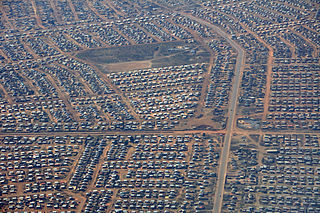
Thokoza, alternatively rendered Tokoza, is a township in Ekurhuleni, Gauteng. Thokoza is at the location of the now-defunct Palmietfontein Airport. It is situated south east of Alberton, adjacent to Katlehong. Thokoza was the first black township which was established in the South. During the early 1990s Thokoza was the middle of unrest between the supporters of the Inkatha Freedom Party (IFP) and the African National Congress (ANC).
Ndabeni is an industrial suburb of Cape Town, South Africa, mainly occupied by light industries such as textiles and clothing. It is located about 6 km east of Cape Town city centre and is serviced by a railway station. Ndabeni is bordered to the south east by Pinelands and to the north by Maitland. Its postcode is 7405.
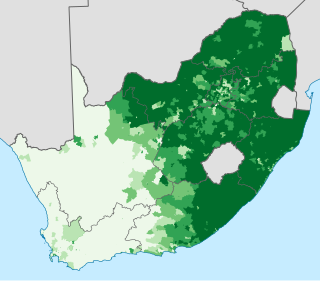
Blacks are the majority ethno-racial group in South Africa, belonging to various Bantu ethnic groups. They are descendants of Southern Bantu-speaking peoples who settled in South Africa during the Bantu expansion.

The Natal Native Contingent was a large force of auxiliary soldiers in British South Africa, forming a substantial portion of the defence forces of the British colony of Natal. The Contingent saw action during the 1879 Anglo-Zulu War. The Natal Mounted Police was created in 1873 to bolster the defenses of Natal. It enlisted European officers, NCOs and natives. The infantry was created in 1878. Most enlisted troops were drawn from the Basuto and Mpondo tribes, which had had long experience fighting the Zulus.
The Natives Land Act, 1913 was an Act of the Parliament of South Africa that was aimed at regulating the acquisition of land. It largely prohibited the sale of land from whites to blacks and vice-versa.

The system of racial segregation and oppression in South Africa known as apartheid was implemented and enforced by many acts and other laws. This legislation served to institutionalize racial discrimination and the dominance by white people over people of other races. While the bulk of this legislation was enacted after the election of the National Party government in 1948, it was preceded by discriminatory legislation enacted under earlier British and Afrikaner governments. Apartheid is distinguished from segregation in other countries by the systematic way in which it was formalized in law.
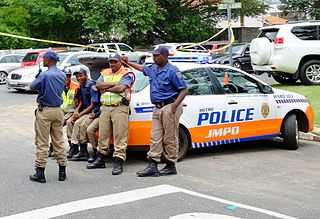
Law enforcement in South Africa is primarily the responsibility of the South African Police Service (SAPS), South Africa's national police force. SAPS is responsible for investigating crime and security throughout the country. The "national police force is crucial for the safety of South Africa's citizens" and was established in accordance with the provisions of Section 205 of the Constitution of South Africa.
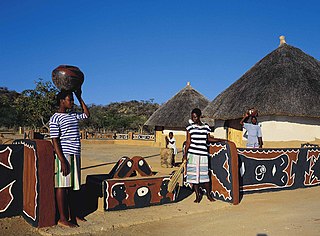
The Pedi or Bapedi - also known as the Northern Sotho, Basotho ba Lebowa, bakgatla ba dithebe, Transvaal Sotho, Marota, or Dikgoshi - are a Sotho-Tswana ethnic group native to South Africa, Botswana, and Lesotho that speak Pedi or Sepedi, which is one of the 12 official languages in South Africa. They are primarily situated in Limpopo, Gauteng and northern Mpumalanga.

The Prevention of Illegal Squatting Act, Act No 52 of 1951, formed part of the apartheid system of racial segregation in South Africa. This act authorized the forcible removal of squatting communities. It allowed eviction and destruction of homes of squatters by landowners, local authorities, and government officials. It was commenced on 6 July 1951.
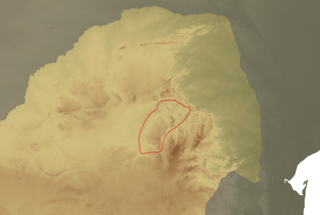
Sekhukhuneland or Sekukuniland is a natural region in north-east South Africa, located in the historical Transvaal zone, former Transvaal Province, also known as Bopedi. The region is named after the 19th-century King, Sekhukhune I.
Thembalethu is a township in Western Cape, South Africa. The township is on the Garden Route and falls part of the George Municipality. The name of the township "Thembalethu" is Xhosa meaning "Our Hope".
References
- Bundy, C. (1972). "The emergence and decline of a South African peasantry". African Affairs. 71 (285). Royal African Society: 369–388. doi:10.1093/oxfordjournals.afraf.a096280.